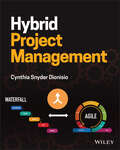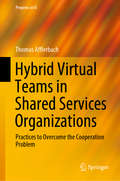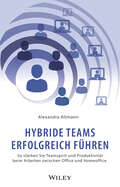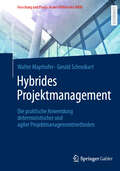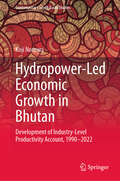- Table View
- List View
Hybrid Predictive Control for Dynamic Transport Problems
by Alfredo Nunez Doris Saez Cristián E. CortésHybrid Predictive Control for Dynamic Transport Problems develops methods for the design of predictive control strategies for nonlinear-dynamic hybrid discrete-/continuous-variable systems. The methodology is designed for real-time applications, particularly the study of dynamic transport systems. Operational and service policies are considered, as well as cost reduction. The control structure is based on a sound definition of the key variables and their evolution. A flexible objective function able to capture the predictive behaviour of the system variables is described. Coupled with efficient algorithms, mainly drawn from area of computational intelligence, this is shown to optimize performance indices for real-time applications. The framework of the proposed predictive control methodology is generic and, being able to solve nonlinear mixed integer optimization problems dynamically, is readily extendable to other industrial processes. The main topics of this book are: · hybrid predictive control (HPC) design based on evolutionary multiobjective optimization (EMO); · HPC based on EMO for dial-a-ride systems; and · HPC based on EMO for operational decisions in public transport systems. Hybrid Predictive Control for Dynamic Transport Problems is a comprehensive analysis of HPC and its application to dynamic transport systems. Introductory material on evolutionary algorithms is presented in summary in an appendix. The text will be of interest to control and transport engineers working on the operational optimization of transport systems and to academic researchers working with hybrid systems. The potential applications of the generic methods presented here to other process fields will make the book of interest to a wider group of researchers, scientists and graduate students working in other control-related disciplines.
Hybrid Project Management
by Cynthia Snyder DionisioHybrid Project Management A how-to guide for leaders of hybrid projects that covers technical and leadership principles across the project delivery spectrum. Hybrid Project Management offers practical guidance for combining waterfall and adaptive (Agile) project management approaches. This helpful guide includes advice on when to use each approach and how various methods can be combined and customized to meet the needs of projects and stakeholders. A sample case study demonstrates how to apply the concepts described throughout the text. An exciting new title from bestselling author Cyndi Snyder Dionisio on a top trending topic in the field, sample topics covered in Hybrid Project Management include: Variables to consider when choosing a development approach Project roles such as sponsors, product owners, project managers, scrum masters, and the project team Launching a hybrid project (vision statements and charters) and structuring the project (development approach, delivery cadence, lifecycle, and roadmap)Project scope requirements, backlogs, and user stories Hybrid scheduling that combines Gantt charts and release plans Leadership in a hybrid project, covering servant leadership, bias, critical thinking, emotional intelligence, motivation, and developing high‐performing teams Managing risk on hybrid projects including estimating reserve and using a risk-adjusted backlog Identifying metrics and reports for predictive and adaptive project work, such as burn charts, variance analysis, forecasts, and cumulative flow diagrams With over fifty percent of projects today being managed using a hybrid approach, Hybrid Project Management serves as an important guide to hybrid project management methods for project management professionals and academia. It is an invaluable resource for understanding the approach and effectively implementing it for better outcomes.
Hybrid Securities: Structuring, Pricing and Risk Assessment
by Kamil Liberadzki Marcin Liberadzki<p>Hybrid capital securities or 'hybrids' offer various benefits. They offer flexibility equity without shareholder dilution, provide protection to senior creditors, are a stable source of long-term funding for healthy companies, and help insurers and banks meet regulatory and rating agency capital requirements. Risks and features of hybrid securities are expressed in the credit spread of some relatively new financial instruments, but no structural fundamentals exist for to price hybrids precisely. <p>This book proposes a model for the pricing of hybrids. It begins by explaining the concept of hybrids as well as their equity- and debt-like characteristics. Different types of hybrids are presented, including preference shares, convertible bonds, contingent convertibles (CoCos) and bail-in bonds. The authors then present analysis of regulatory regimes' impact on hybrids. They discuss the types of hybrid bonds that are contemplated in the Capital Requirements Regulation (CRR) and Banking Union mechanism. They then present an in-depth examination of hybrids pricing and risk assessment techniques. The book provides a comprehensive analysis from mathematical, legal and financial perspectives in order to look at relatively new financial instruments and address problems with the pricing models of hybrids which are as yet unsolved.</p>
Hybrid Virtual Teams in Shared Services Organizations: Practices to Overcome the Cooperation Problem (Progress in IS)
by Thomas AfflerbachThis book focuses on virtual teams, which are fraught with cooperation problems. It offers novel insights into how team members experience and overcome these problems by empirically studying hybrid virtual teams in Shared Services Organizations. It firstly enhances the reader’s understanding of contextual challenges relating to cooperation and shows how members of such teams experience faultlines through distance, disconnection through reliance on communication technology and discontinuity through temporality of team composition. Secondly, it explores how they use 22 practices to overcome the cooperation problem, which can be categorized as strategies of identity constructing, trusting and virtual peer monitoring. Lastly, the study analyzes the role of technology, demonstrating that state-of-the-art media can facilitate, but not ensure the use of these strategies and practices. As such, the book has implications for both researchers and practitioners.
Hybrid Workplace Hacks: Strategies to Set Up and Lead Successful In-Person and Remote Teams
by Scott SteinHack your way to a better hybrid workplace The COVID-19 pandemic forced many employees to vacate the office and work from their homes and find new ways of working. Now, employees are demanding more workplace flexibility, something between the daily office grind and working alone at home. Hybrid workplaces allow for the best of both worlds to create a unified culture between on-site and off-site employees. So in order to retain valued staff, it’s up to business leaders to get hybrid right. In Hybrid Workplace Hacks, Scott Stein, leadership expert and best-selling author of Leadership Hacks, reveals proven hacks to make your hybrid workplace a resounding success, no matter where your employees are. Through in-depth case studies and relevant tips and tricks, you’ll learn: the hybrid trends and how to navigate them which hybrid model is right for your business how home and office layouts help or hinder hybrid success the tools you’ll need to keep employees engaged how to foster an effective hybrid culture. Hybrid is the new way of working and it’s here to stay. In Hybrid Workplace Hacks, you’ll learn the best techniques for working and leading more flexibly and discover how to make hybrid work for your team for winning results.
Hybrid, flexibel und vernetzt?: Möglichkeiten, Bedingungen und Grenzen von digitalen Lernumgebungen in der wissenschaftlichen Weiterbildung (Doing Higher Education)
by Rudolf Egger Stephan WitzelDer Band ist eine Auswahl von derzeit praktizierten Online/Hybrid-Formaten und deren didaktische Grundlegung in der (wissenschaftlichen) Weiterbildung. Gefragt wir danach, welche Erfahrungen und konkreten Angebote bzw. didaktischen Überlegungen den Ruf nach verstärkter flexibler Online-Lehre rahmen. Dabei sollen einerseits Praxisbeispiele, Materialien und Handlungsanleitungen im Mittelpunkt stehen, zum anderen soll der wissenschaftliche Diskurs über die Möglichkeiten, Voraussetzungen und auch die Grenzen derartiger Lehr- und Lernformen erweitert werden. Vor allem aus didaktischer Sicht ist hier zu klären, ob und wie dies mit den derzeitigen Formaten einzulösen ist und ob das zutrifft, was vielerorts behauptet wird: „The learning is equivalent, regardless the mode.”
Hybride Arbeitsgestaltung: Herausforderungen und Chancen
by Alexandra ClootsDieses Fachbuch richtet sich an Personen, die die Arbeit der Zukunft in ihren Organisationen gestalten möchten. Covid-19 hat insbesondere das Modell des Homeoffice gefordert und gefördert. Um zukunftsfähig zu sein, müssen Organisationen neue Arbeitsmodelle und -flexibilisierungen einführen. Organisationen und die Arbeit werden damit aber auch hybrider. Dies bedeutet Herausforderungen auf Individuums-, Team-, Führungs- und Organisationsebene. Expertinnen und Experten aus Wissenschaft und Praxis beschäftigen sich in diesem Buch mit den Möglichkeiten einer zukunftsfähigen Arbeitskultur und leiten Empfehlungen ab. Dabei werden auch Themen wie Zusammenarbeit, digitale Führung, Selbstorganisation, Wissensmanagement sowie Work-Life-Balance angesprochen. Beispiele aus der Unternehmenspraxis ergänzen die Ausführungen.
Hybride Arbeitswelt: Empfehlungen für die Arbeit zwischen Home und Office (essentials)
by Dominic LindnerSchon seit über einem Jahrhundert hat sich unsere Arbeitswelt immer wieder verändert. Durch die Covid-19-Pandemie hat die Digitalisierung des Arbeitsplatzes einen nachhaltigen Schub erhalten. Mit dem zunehmenden Rückgang der Pandemie kehren Fachkräfte wieder in das klassische Büro zurück. Dennoch ist die Arbeitswelt nicht mehr die, die wir kannten. Der Spagat zwischen Home und Office wird unsere Arbeitswelt dominieren, weshalb es gilt, die Vorteile beider Welten in einer hybriden Arbeitskultur zu vereinen. Doch wie kann dieser Spagat ausgestaltet werden? In diesem Essential werden erste Antworten aus Wissenschaft und Praxis gegeben und Empfehlungen formuliert, die Praktiker*innen in der Strategiefindung helfen sowie Dozierenden und Studierenden als Input für die weitere Forschung dienen sollen.
Hybride Events: Zukunft und Herausforderung für Live-Kommunikation (essentials)
by Colja M. Dams Stefan LuppoldColja M. Dams und Stefan Luppold zeigen anhand von Beispielen, wie es gelingt, neben der Kontaktintensitat des Events gleichzeitig die Kontaktreichweite wesentlich zu erhohen, indem das Live-Erlebnis mit den Moglichkeiten der digitalen Kommunikation im Internet als hybride Events kombiniert wird. Die Autoren skizzieren die Zukunft fur hybride Events und stellen zehn Grundregeln fur deren Einsatz auf. Denn der vielzitierte Paradigmenwechsel in der Kommunikation hat langst stattgefunden. Nicht mehr die absenderorientierten Botschaften der Marken- oder Produktwelt stehen im Vordergrund, sondern der Dialog mit den Zielgruppen. Das Event aber bleibt der Ort, an dem die personlichen Bedurfnisse und damit die Individualitat der Konsumenten am besten erkannt und bedient werden konnen. "
Hybride Teams erfolgreich führen: So stärken Sie Teamspirit und Produktivität beim Arbeiten zwischen Office und Homeoffice
by Alexandra AltmannHybride Teamarbeit, bei der einige Teammitglieder aus dem Büro und andere mobil arbeiten - und das oft an wechselnden Tagen -, ist inzwischen zum Standard geworden. Das Buch der Wirtschaftspsychologin und Leadership-Expertin Alexandra Altmann zeigt die Herausforderungen und Erfolgsfaktoren für die Führungskräfte dieser Teams auf und bietet Inspiration und konkrete Hilfestellung für den eigenen Führungserfolg. Dabei geht das Buch anhand des Modells für erfolgreiches Führen von hybriden Teams mit vielen Storys aus dem Organisationsalltag und konkreten Praxistipps tief auf 3 Ebenen ein: - Mindset: Welche Einstellung brauchen Führungskräfte für ihre veränderte Führungsaufgabe? - Skillset: Wie müssen sie ihre Führungsverhalten anpassen und erweitern? - Toolset: Welche Tools und Technologie sollten sie nutzen, um die Kommunikation und Zusammenarbeit in hybriden Teams produktiv und persönlich zu gestalten? Das Buch wird angereichert mit Online-Checklisten und Tools, die über eine eigene Website zum Buch bereitgestellt werden. Dazu gehört auch ein "Reifegrad-Check", mit dem die Führungskräfte ihre eigene Kompetenz beim Führen hybrider Teams einschätzen können. Damit kann das Buch auch von Organisationen als Standardwerk für ihre Führungskräfteausbildung genutzt werden.
Hybride ökonomische Akteure und Organisationen: Anomalien, Normalität oder Artefakte – eine Annäherung
by Michael-Burkhard PiorkowskyAußerhalb der ökonomischen Standardliteratur wird in wirtschafts- und sozialwissenschaftlichen Fachgemeinschaften schon länger über hybride ökonomische Akteure und Organisationen gesprochen, geschrieben und diskutiert. Allerdings sind die Begründungen für die Zuschreibung von Hybridität in den hier untersuchten Fällen weder einheitlich noch stets nachvollziehbar.In diesem Buch wird ein institutionenökonomischer Zugriff für die Analyse von ökonomischer Hybridität gewählt, der sich an der Theorie der Wohlfahrtsproduktion von Wolfgang Zapf und der Unterscheidung institutioneller ökonomischer Sektoren im Europäischen System der Volkswirtschaftlichen Gesamtrechnung orientiert.Der Autor verdeutlicht damit klar nachvollziehbar und theoretisch fundiert die Gestalt- und Formbarkeit der Ökonomie durch die personalen Akteure in ihren organisatorischen Kontexten. Er schließt damit an die Argumentation seines Buches "Ökonomie ist menschlich" aus dem Jahr 2020 an.
Hybrides Arbeiten und Lernen in virtuellen Welten: Mit zahlreichen Beispielen und Impulsen aus der Remote-Work-Praxis
by Dirk Engel Holger FischerWie können wir die Möglichkeiten von virtuellen Welten und Künstlicher Intelligenz schon jetzt bestmöglich für die Lern- und Arbeitswelt nutzen? Dieses Praxisbuch gibt Antworten und richtet den Blick auf das Hier und Jetzt. Die Autoren zeigen, weshalb es in Zeiten von Remote Work neue Lösungen in der Zusammenarbeit braucht und wie virtuelle Welten dabei helfen können. Neben leicht verständlichen Erklärungen von Begriffen, wie Virtual Reality oder hybrides Arbeiten, vermitteln konkrete Anwendungsbeispiele aus Unternehmen schnell ein Bild über die Vorteile des Metaverse. Eine Checkliste hilft dabei zu prüfen, ob Ihr Unternehmen für den Einstieg in virtuelle Arbeits- und Lernwelten bereit ist.Zahlreiche Use Cases und Experteninterviews geben Ihnen praktische Impulse für den einfachen und effektiven Einstieg in virtuelle Welten an die Hand. Machen auch Sie Ihr Unternehmen jetzt fit für die Zukunft!
Hybrides Innovationsmanagement für den Mittelstand in einer VUCA-Welt: Vorgehensmodelle – Methoden – Erfolgsfaktoren – Praxisbeispiele
by Kurt GaubingerSteigende Volatilität, Unsicherheit, Komplexität sowie Mehrdeutigkeit des Unternehmensumfelds machen es für mittelständische Unternehmen immer herausfordernder, innovative Produkte, Dienstleistungen und Geschäftsmodelle zu entwickeln.Auf Basis einer in Österreich durchgeführten Benchmarking-Studie zum Thema „Produktentwicklung und Innovationsmanagement mittelständischer Unternehmen in einer VUCA-Welt“ entwickelt der Autor ein hybrides Innovationsmanagement-System, welches in synergetischer Weise die Vorzüge strukturierter Stage-Gate-Prozesse mit den Vorteilen agiler Methoden verbindet und damit in mittelständischen Unternehmen als zeitgemäßes Referenzframework für das Management von Innovationen herangezogen werden kann. Neben der detaillierten Beschreibung hybrider Vorgehensmodelle und Methoden zeigt dieses Framework auch auf, welche organisatorischen und kulturellen Rahmenbedingungen in diesem Kontext in einem Unternehmen gegeben sein müssen. Darüber hinaus liefern konkrete Praxisbeispiele und Methodenbeschreibungen zu jedem Element des Systems eine wertvolle Hilfestellung für die praktische Implementierung und Anwendung in Unternehmen und zeigen auf, wie erfolgreiches Innovationsmanagement unter Berücksichtigung der individuellen Rahmenbedingungen in einer VUCA-Welt gelingen kann.Das Werk richtet sich an Führungskräfte in mittelständischen Unternehmen der Sachgüterindustrie sowie Praktiker aus den Bereichen Forschung & Entwicklung, Innovationsmanagement sowie Produktmanagement. Es eignet sich auch für Dozierende und Studierende der Wirtschaftswissenschaften und der Ingenieurwissenschaften mit den Schwerpunkten Produktentwicklung, Innovationsmanagement, Mittelstand sowie KMU-Forschung.
Hybrides Projektmanagement: Die praktische Anwendung deterministischer und agiler Projektmanagementmethoden (Forschung und Praxis an der FHWien der WKW)
by Walter Mayrhofer Gerald SchneikartDieses Lehrbuch vermittelt die Grundlagen und die Anwendung der Projektplanung sowie des Projektcontrollings prägnant und praxisorientiert. Dabei adressieren die Autoren Einsteiger ins Projektmanagement ebenso wie erfahrene Projektmanager und es stehen bewährte traditionelle Methoden in Kombination mit neueren, agilen Ansätzen des Projektmanagements im Fokus der Betrachtungen. Da Theorie und Praxis mitunter getrennte Wege gehen, wird die Applikation der beschriebenen Projektmanagementmethoden begleitend anhand eines Projektes mit hybridem Ansatz veranschaulicht. Um dies möglichst praxisnah zu gestalten, wurde hierfür ein reales, erfolgreich abgeschlossenes Digitalisierungsprojekt der angewandten Forschung als Grundlage verwendet.
Hydrocarbon Hucksters: Lessons From Louisiana on Oil, Politics, and Environmental Justice
by Ernest Zebrowski Mariah Zebrowski LeachHydrocarbon Hucksters is the saga of the oil industry's takeover of Louisiana--its leaders, its laws, its environment, and, by rechanneling the flow of public information, its voters. It is a chronicle of mindboggling scientific and technical triumphs sharing the same public stew with myths about the "goodness" of oil and bald-faced public lies by politicians and the captains of industry. It is a story of money and power, greed and corruption, jingoism and exploitation, pollution and disease, and the bewilderment and resignation of too many of the powerless. Most importantly, Hydrocarbon Hucksters is a case study of what happens when a state uncritically hands the oil and petrochemical industries everything they desire. Today, Louisiana ranks at or near the bottom of the fifty states on virtually every measure related to the quality of life--income, health, education, environment, public services, public safety, physical infrastructure, and vulnerability to disasters (both natural and man-made). Nor, contrary to the claims of the hydrocarbon sector, has there been much in the way of job creation to offset all of this social grief. The authors (one a scientist, the other an environmental lawyer) have woven together the science, legal history, economic issues, and national and global contexts of what has happened. Their objective is to raise enough national awareness to prevent other parts of the United States from repeating Louisiana's historical follies. The authors are uncle and niece, a generation apart, who have melded their conclusions from two separate tracks.
Hydrodynamics of Markets: Hidden Links between Physics and Finance (Elements in Quantitative Finance)
by Alexander LiptonAn intriguing link between a wide range of problems occurring in physics and financial engineering is presented. These problems include the evolution of small perturbations of linear flows in hydrodynamics, the movements of particles in random fields described by the Kolmogorov and Klein-Kramers equations, the Ornstein-Uhlenbeck and Feller processes, and their generalizations. They are reduced to affine differential and pseudo-differential equations and solved in a unified way by using Kelvin waves and developing a comprehensive math framework for calculating transition probabilities and expectations. Kelvin waves are instrumental for studying the well-known Black-Scholes, Heston, and Stein-Stein models and more complex path-dependent volatility models, as well as the pricing of Asian options, volatility and variance swaps, bonds, and bond options. Kelvin waves help to solve several cutting-edge problems, including hedging the impermanent loss of Automated Market Makers for cryptocurrency trading. This title is also available as Open Access on Cambridge Core.
Hydrogen Energy: Economic and Social Challenges
by Paul EkinsHydrogen could be a significant fuel of the future, with the potential to make a major contribution to the resolution of pressing social and environmental problems such as carbon emissions, energy security and local air pollution. This book, based on four years of detailed research, subjects the promise and potential of hydrogen to searching, in-depth socio-economic analysis. It discusses the different technologies for the production, distribution, storage and use of hydrogen, and analyses the economics of these technologies and their current market prospects. It also describes various experiences with aspects of a hydrogen economy in two parts of the world - the UK and Canada - and then assesses the nature of different hydrogen futures that might develop depending on how the technology, economics, social acceptance and policy frameworks play out in different contexts. The book ends by setting out the policy drivers and levers which could stimulate a virtuous circle of research and development, innovation and investment that might ultimately generate a sustainable hydrogen economy. This is essential reading for economists, engineers, business leaders, investors, policy makers, researchers and students who are interested in the future of the energy system and the part that hydrogen might play in it.
Hydrogeology: Introduction To Applied Hydrogeology (Springer Textbooks in Earth Sciences, Geography and Environment)
by Bernward Hölting Wilhelm G. ColdeweyThis textbook provides a complete introduction to Hydrogeology. It is a comprehensive reference for earth science professionals involved in groundwater exploitation as well as for geotechnical engineers. This English translation of the German textbook "Hydrogeologie" by Hölting & Coldewey, which has been published in its 8th edition, provides insights into the sources and reservoirs of groundwater, the dynamics of fluid flow, and the physical and chemical composition of groundwater. It also gives an overview about the economic value of groundwater and its exploitation and use. A consistent use of the internationally accepted SI units as well as the formula symbols in the text contributes to the understandability.
Hydrohumanities: Water Discourse and Environmental Futures
by Kim De Wolff, Rina C. Faletti and Ignacio López-CalvoA free open access ebook is available upon publication. Learn more at www.luminosoa.org. Discourse about water and power in the modern era have largely focused on human power over water: who gets to own and control a limited resource that has incredible economic potential. As a result, discussion of water, even in the humanities, has traditionally focused on fresh water for human use. Today, climate extremes from drought to flooding are forcing humanities scholars to reimagine water discourse. This volume exemplifies how interdisciplinary cultural approaches can transform water conversations. The manuscript is organized into three emergent themes in water studies: agency of water, fluid identities, and cultural currencies. The first section deals with the properties of water and the ways in which water challenges human plans for control. The second section explores how water (or lack of it) shapes human collective and individual identities. The third engages notions of value and circulation to think about how water has been managed and employed for local, national, and international gains. Contributions come from preeminent as well as emerging voices across humanities fields including history, art history, philosophy, and science and technology studies. Part of a bigger goal for shaping the environmental humanities, the book broadens the concept of water to include not just water in oceans and rivers but also in pipes, ice floes, marshes, bottles, dams, and more. Each piece shows how humanities scholarship has world-changing potential to achieve more just water futures.
Hydrology of Disasters: Proceedings of the World Meteorological Organization Technical Conference Held in Geneva, November 1988
by Dr O Starosolszky O M MelderThis timely book reviews the hydrological aspects of different types of disaster and considers measures required to protect people and property against such events as well as disaster prediction, forecasting and monitoring. Its publications coincide with the start of the United Nations Decade for Natural Disaster Reduction. It comprises twenty-seven papers by experts from a wide range of countries and organizations presented at the Technical Conference convened by the World Meteorological Organization in Geneva in November 1988. The contributions are grouped into five sections covering hydrological problems of extreme floods and droughts, consequences of accidental water pollution, hydrological problems of dam and levee rupture, hydrological consequences of volcanic eruptions and hydrological consequences of earthquakes, landslides and avalanches. By drawing together work on a wide range of hydrological problems, this book is a valuable reference source for all scientist, engineers and policy- makers whose work touches on this diverse field.
Hydrometallurgy in Extraction Processes, Volume I
by T.K. MukherjeeThis two-volume set provides a full account of hydrometallurgy. Filled with illustrations and tables, this work covers the flow of source material from the mined or concentrate state to the finished product. It also highlights ion exchange, carbon adsorption and solvent extraction processes for solution purification and concentration. The extensive
Hydropolitics: The Itaipu Dam, Sovereignty, and the Engineering of Modern South America (Princeton Studies in Culture and Technology #20)
by Professor Christine FolchAn in-depth look at the people and institutions connected with the Itaipu Dam, the world’s biggest producer of renewable energyHydropolitics is a groundbreaking investigation of the world’s largest power plant and the ways the energy we use shapes politics and economics. Itaipu Binational Hydroelectric Dam straddles the Paraná River border that divides the two countries that equally co-own the dam, Brazil and Paraguay. It generates the carbon-free electricity that powers industry in both the giant of South America and one of the smallest economies of the region. Based on unprecedented access to energy decision makers, Christine Folch reveals how Paraguayans harness the dam to engineer wealth, power, and sovereignty, demonstrating how energy capture influences social structures.During the dam’s construction under the right-wing military government of Alfredo Stroessner and later during the leftist presidency of liberation theologian Fernando Lugo, the dam became central to debates about development, governance, and prosperity. Dams not only change landscapes; Folch asserts that the properties of water, transmuted by dams, change states. She argues that the dam converts water into electricity and money to produce hydropolitics through its physical infrastructure, the financial liquidity of energy monies, and the international legal agreements managing transboundary water resources between Brazil and Paraguay, and their neighbors Argentina, Bolivia, and Uruguay.Looking at the fraught political discussions about the future of the world’s single largest producer of renewable energy, Hydropolitics explores how this massive public works project touches the lives of all who are linked to it.
Hydropower and Renewable Energies: Synergistic Integration for Future Energy Systems (Lecture Notes in Civil Engineering #487)
by Gensheng Zhao Sheng’an Zheng Richard M. Taylor Wenhao Wu Bjorn NilsenThis open access book explores the complementarity of hydropower with new energy sources such as solar and wind in the global energy transition. It analyzes the technological advantages, environmental impacts, and economic potential of combining hydropower and new energy sources, while examining the related policies and market mechanisms. Through a multidimensional approach, the book demonstrates the importance of this energy integration in improving energy system efficiency, reducing carbon emissions, and promoting sustainable development. Starting with the challenges and strategies of technology integration, the book will explore the role of smart grid management and energy storage technologies in this context, providing quantitative and qualitative assessments of the ecosystem and socio-economic impacts of such energy synergies. Valuable knowledge and practical guidance for energy researchers, policy makers and professionals in the field of sustainable development.
Hydropower-Led Economic Growth in Bhutan: Development of Industry-Level Productivity Account, 1990–2022 (Contemporary South Asian Studies)
by Koji NomuraThis book provides a comprehensive analysis of Bhutan&’s economic growth and productivity dynamics from 1990 to 2022, with a special focus on hydropower development. Through the construction of detailed industry-level productivity accounts, the study addresses significant data gaps in Bhutan&’s national accounts, measuring outputs and inputs across various sectors and developing quality-adjusted labor and capital input series. The analysis reveals the complexities of Bhutan&’s hydropower-led growth strategy: while the sector has driven substantial economic growth, its contribution to overall productivity improvement has been limited. The electricity sector shows gains in labor productivity but declining capital productivity, resulting in stagnant Total Factor Productivity (TFP). The study also examines productivity trends in non-electricity sectors and addresses potential &“Dutch disease&” effects on manufacturing and agricultural competitiveness. International comparisons place Bhutan&’s productivity performance in a regional context, revealing significant gaps in productivity performance, particularly when compared to India, Bhutan&’s largest trading partner and a regional economic benchmark. This comparative analysis informs policy recommendations for achieving more balanced and sustainable economic growth. The findings are particularly relevant for Bhutan&’s Thirteenth Five-Year Plan (2024–2029), which emphasizes productivity improvements across all economic sectors. The book serves as a valuable resource for policymakers, economists, and researchers interested in development economics, particularly those focused on the unique challenges faced by small, landlocked nations pursuing sustainable economic development.
Hygeia Group: Delivering Quality Care in Nigeria
by Robert F. Higgins Ifedayo O. KuyeFola Laoye is the Group Managing Director of Hygeia Group, a Nigerian healthcare insurer and provider, and she is deciding on the optimal strategy to grow the provider arm of her business. Hygeia Group was founded in the 1980s by her physician parents, and although operating a healthcare company in Nigeria offered challenges particularly in human resources and infrastructure, by 2011, it had expanded to include three hospital and clinic sites and a large insurance company. The company has just received a large equity investment from an international private equity company, and it has decided to focus on expanding tertiary care capabilities in its hospitals. A consulting team has identified cardiology, oncology and advanced surgery (orthopedic and minimally invasive) as areas with strategic potential. However, Ms. Laoye must decide which of these options offers the greatest growth opportunities. In addition, as her company grows, she must decide the how best to structure the payor and provider aspects of her business in a way that maximizes synergies for both.

